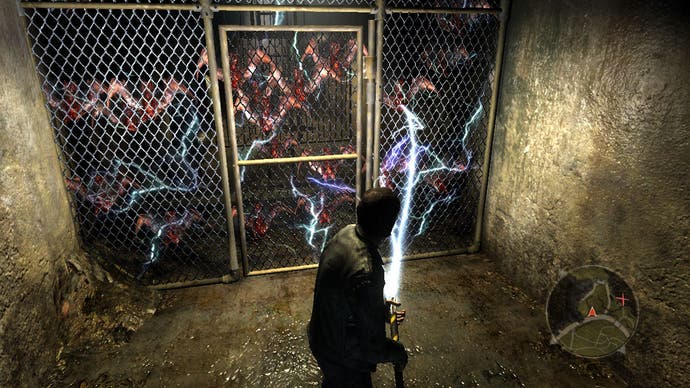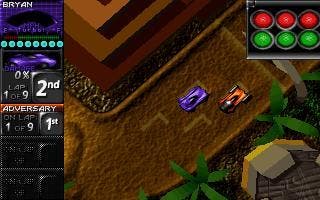History of Atari
What's Big Phil getting himself into?
Transforming the look of the logo, Hasbro proceeded to release its 3D-based retro-remake products under the Atari label, until they took a hit when the dot-com bubble burst in 2000. The Atari name and properties were then sold to French videogames publisher Infogrames via its purchase of the entire Hasbro Interactive division, renaming it Infogrames Interactive in the process.
Infogrames, and its founder Bruno Bonnell, had been on a buying spree in the late nineties and into the next decade, buying up a multitude of videogame companies and their properties. The most important of these deals was its purchase of a controlling interest in American publisher GT Interactive.
Soon having the company renamed Infogrames North America, Infogrames began using it for all its North American development and publishing operations. With the purchase of the US-based Hasbro Interactive, Bonnell decided to focus on the Atari name and properties.
The plan was to use the name to associate his business with the former glory that many older gamers remembered fondly while trying to build the name up with younger gamers who were more familiar with Nintendo and Sony.
He proceeded to rebrand Infogrames Interactive to Atari Interactive, then rename all of his worldwide subsidiaries to Atari spin-offs, such as "Atari Europe". Infogrames NA, the former GT Interactive, was forced to lease the name and pay royalties on any Atari properties it used. It subsequently renamed itself Atari Inc, something of an ill omen, as history began to repeat itself.
As with the original Atari Inc twenty years previously, the company began a downward spiral in earnings that affected parent Infogrames as well. Bringing in former Sony Music management, unfamiliar with the videogame industry, did not help.

Infogrames sold off much of its acquired properties during the mid-2000s, and even struck a credit agreement with financial juggernaut BlueBay, who wound up taking controlling interest of Infogrames. With a succession in management personnel that even included Bonnell himself for a time before he was forced out of Infogrames, the problems continued to mount with Atari Inc.
When BlueBay installed Patrick Leleu on the Infogrames board, it immediately began pushing for Atari Inc to become a publishing-only firm. BlueBay's stranglehold was further strengthened when they forced Atari Inc's last CEO, David Pearce, to leave as well as dismissing Atari Inc's board and installing its own last October.
It proceeded to 'lend' money to Atari Inc with terms that would have been impossible to pay back given their financial situation, and consequently Atari Inc has been in default and should find out soon what its future will hold.
Atari Inc has also been in notice for delisting from NASDAQ, the deadline of which also falls shortly. A large number of staff exits from the firm have taken place in the last six months and it's unclear who still remains in the ghost town that was once a busy mass of cubicles.
Meanwhile Infogrames has been trying to insulate itself income-wise from Atari Inc and moved to start up its own publishing and development operations again. It 'unlicensed' the Atari.com website back to itself, as well as taking over some of Atari Inc's original development projects from the past year.
Interestingly, Infogrames has continued to refer to itself as "Atari" in interviews, when it really means its direct divisions like Atari Interactive and Atari Europe rather than Atari Inc, a matter which has often caused confusion.

Most recently Patrick Leleu was forced to resign as Infogrames CEO, and the respected former Electronic Arts executive David Gardner was been brought in to replace him. By the end of last month GamesIndustry.biz first reported the news that key industry figure Phil Harrison was leaving Sony to join up with Gardner at Infogrames.
This was followed by an announcement of the company's planned move to an online gaming model, which although hailed by many as something new, in reality was a similar idea to one proposed when Bonnell was at the helm.
While momentum is gathering with Infogrames/Atari Europe, the chances of Atari Inc's survival in the US are slim. It has no way to bring in any sizeable income, and as a distributor cannot compete with companies with more established channels, such as Mecca and Alliance.
The default on its loan from BlueBay and its impending delisting also form part of a very steep mountain, especially when Atari Inc already reversed a stock split last year - a move Infogrames recently set in motion itself.
Ultimately, the modern-day "Tale of Two Ataris" is unlikely to yield a happy ending for both organisations, but while Atari Inc founders under a debt mountain with no obvious way out, Infogrames/Atari looks on rather more solid ground.
Martin Goldberg is a freelance writer and programmer - in addition to being a long-time staff member at ClassicGaming.Com, he also co-organises the Midwest Gaming Classic, one of the largest consumer-based industry shows in the US. This article was originally published on our sister site GamesIndustry.biz.
